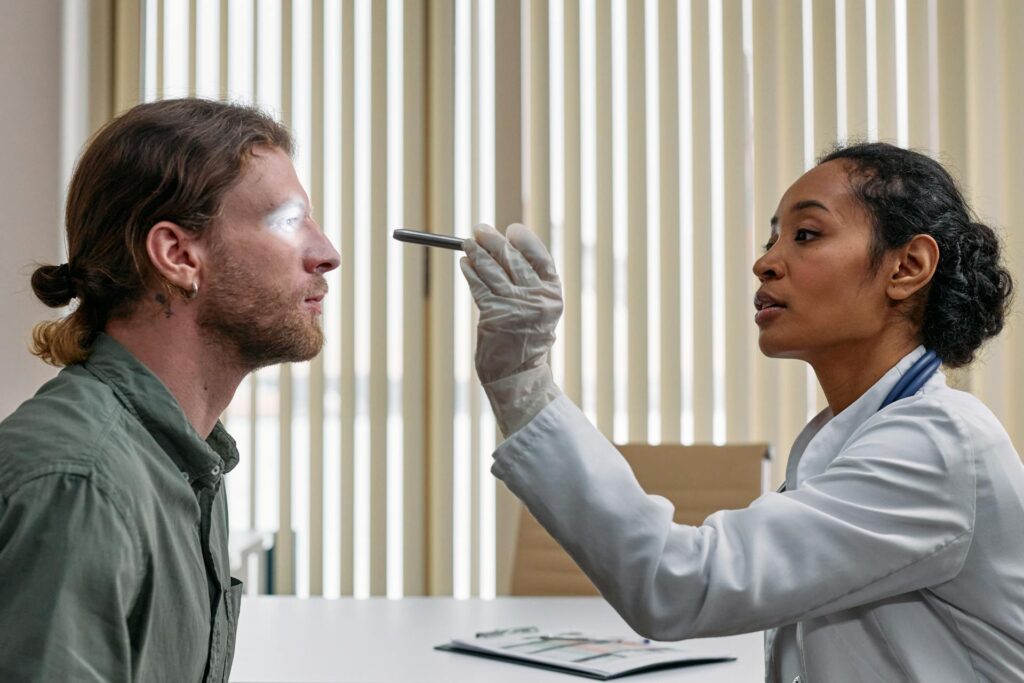Your eyesight is one of your most precious senses, allowing you to experience and interact with the world around you. Protecting your vision should be a top priority, and there are several steps you can take daily to maintain and safeguard your eye health. Here are eight effective ways to protect your eyesight.
1. Get Regular Eye Exams
- Importance: Regular eye exams can detect problems early when they are most treatable.
- Frequency: Adults should have a comprehensive eye exam every 1-2 years, or as recommended by their eye care provider.
- Children: Ensure children have regular eye exams to detect vision issues that could affect learning and development.
What to Expect:
- Visual Acuity Test: Measures how well you see at various distances.
- Dilated Eye Exam: Provides a detailed view of the retina and optic nerve.
- Tonometry: Measures intraocular pressure to screen for glaucoma.
2. Wear Sunglasses
- UV Protection: Choose sunglasses that block 100% of UVA and UVB rays to protect your eyes from harmful ultraviolet light.
- Preventing Damage: Prolonged exposure to UV rays can cause cataracts, macular degeneration, and other eye conditions.
- Types of Sunglasses: Wraparound styles offer additional protection by blocking light from the sides.

3. Follow a Healthy Diet
- Vitamins and Minerals: Foods rich in vitamins A, C, and E, as well as zinc, support eye health.
- Antioxidants: Lutein and zeaxanthin, found in green leafy vegetables, protect against age-related macular degeneration.
- Omega-3 Fatty Acids: Found in fish like salmon and tuna, these helps maintain retinal health.
Recommended Foods:
- Vegetables: Spinach, kale, and collards.
- Fruits: Oranges, strawberries, and other citrus fruits.
- Nuts and Seeds: Almonds, walnuts, and flaxseeds.
4. Protect Your Eyes from Digital Strain
- 20-20-20 Rule: Every 20 minutes, take a 20-second break to look at something 20 feet away.
- Blink Frequently: Blinking helps keep your eyes lubricated.
- Screen Settings: Adjust brightness, contrast, and use blue light filters to reduce strain.
Ergonomic Setup:
- Distance: Position your screen about an arm’s length away and slightly below eye level.
- Lighting: Use adequate lighting to reduce glare and avoid working in dimly lit environments.
5. Stay Hydrated
- Drink Water: Staying hydrated helps maintain the moisture balance in your eyes.
- Limit Dehydrating Beverages: Reduce intake of caffeine and alcohol, which can contribute to dehydration.
6. Use Protective Eyewear
- Sports and Work: Wear safety glasses or goggles during activities that pose a risk to your eyes, such as construction work, laboratory experiments, or certain sports.
- Impact-Resistant Lenses: Choose polycarbonate lenses for better protection against impacts.
Specific Situations:
- Home Improvement: Wear eye protection when using power tools or handling hazardous materials.
- Sun Protection: Besides sunglasses, use hats with brims to provide extra shade.
7. Quit Smoking
- Harmful Effects: Smoking increases the risk of cataracts, macular degeneration, and optic nerve damage.
- Benefits of Quitting: Quitting smoking can significantly improve your overall eye health and reduce the risk of these conditions.
Support for Quitting:
- Resources: Seek support from healthcare providers, support groups, and smoking cessation programs.
- Healthy Habits: Replace smoking with healthier activities like exercise or hobbies.
8. Maintain a Healthy Lifestyle
- Exercise Regularly: Physical activity improves blood circulation, which benefits your eyes.
- Manage Chronic Conditions: Keep conditions like diabetes and high blood pressure under control to prevent complications that affect your eyes.
Healthy Habits:
- Balanced Diet: Follow a diet rich in fruits, vegetables, whole grains, and lean proteins.
- Adequate Sleep: Ensure you get enough sleep to help your eyes recover from daily strain.
Routine Check-Ups:
- Monitor Health: Regular check-ups can help detect and manage conditions that could affect your vision.
- Stay Informed: Keep abreast of the latest research and recommendations for eye health.
Protecting your eyesight requires a combination of preventive measures, healthy habits, and regular monitoring. By following these eight tips—getting regular eye exams, wearing sunglasses, maintaining a healthy diet, protecting your eyes from digital strain, staying hydrated, using protective eyewear, quitting smoking, and maintaining a healthy lifestyle—you can significantly reduce the risk of vision problems and preserve your eyesight for years to come. Make these practices part of your daily routine to ensure optimal eye health and enjoy the benefits of clear, healthy vision.





